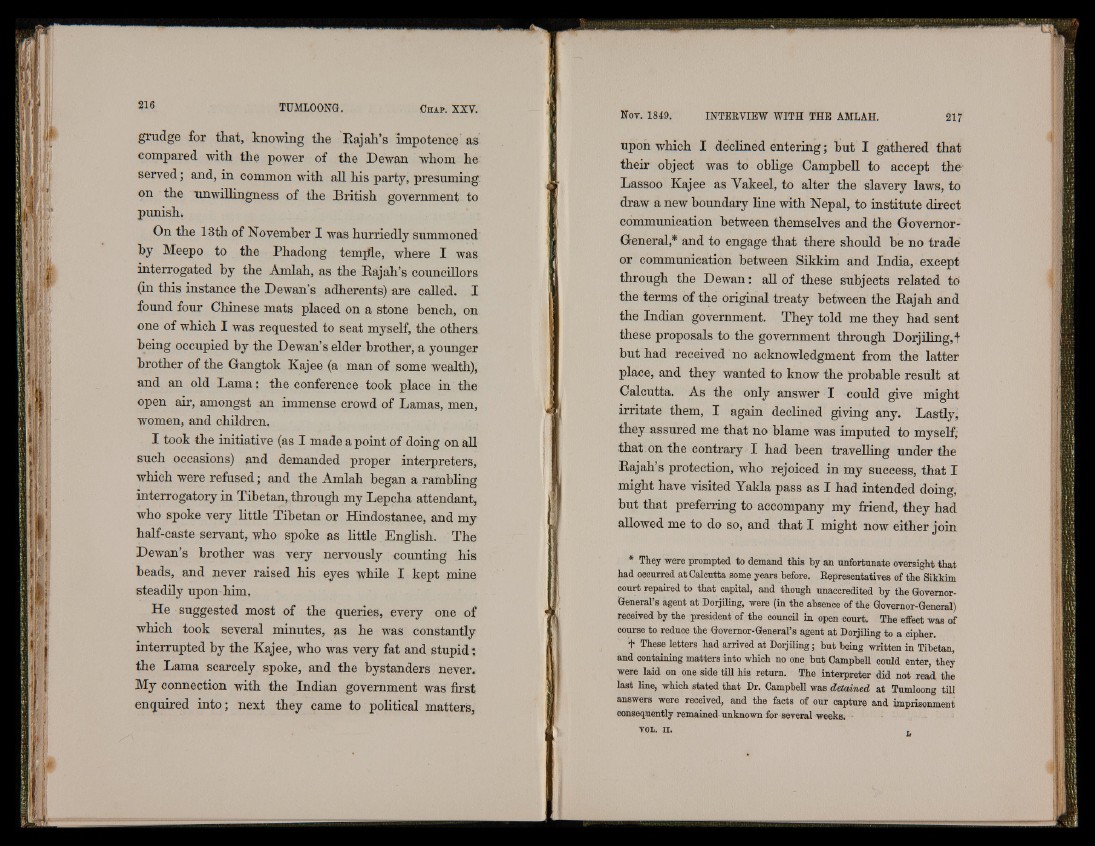
grudge for that, knowing the Rajah’s impotence as
compared with the power of the Dewan whom he
served; and, in common with all his party, presuming
on the iinwillingness of the British government to
punish.
On the 13th of November I was hurriedly summoned
by Meepo to the Phadong temple, where I was
interrogated by the Amlah, as the Rajah’s councillors
(in this instance the Dewan’s adherents) are called. I
found four Chinese mats placed on a stone bench, on
one of which I was requested to seat myself, the others
being occupied by the Dewan’s elder brother, a younger
brother of the Gangtok Kajee (a man of some wealth),
and an old L ama: the conference took place in the
open air, amongst an immense crowd of Lamas, men,
women, and children,
I took the initiative (as I made a point of doing on all
such occasions) and demanded proper interpreters,
which were refused; and the Amlah began a rambling
interrogatory in Tibetan, through my Lepcha attendant,
who spoke very little Tibetan or Hindostanee, and my
half-caste servant, who spoke as little English. The
Dewan’s brother was very nervously counting his
beads, and never raised his eyes while I kept mine
steadily upon him.
He suggested most of the queries, every one of
which took several minutes, as he was constantly
interrupted by the Kajee, who was very fat and stupid:
the Lama scarcely spoke, and the bystanders never.
My connection with the Indian government was first
enquired into; next they came to political matters,
upon which I declined entering; but I gathered that
their object was to oblige Campbell to accept the-
Lassoo Kajee as Yakeel, to alter the slavery laws, to
draw a new boundary line with Nepal, to institute direct
communication between themselves and the Governor-
General,315 and to engage that there should be no trade
or communication between Sikkim and India, except
through the Dewan: all of these subjects related to
the terms of the original treaty between the Rajah and
the Indian government. They told me they had sent
these proposals to the government through Dorjiling, t
but had received no acknowledgment from the latter
place, and they wanted to know the probable result at
Calcutta. As the only answer I could give might
irritate them, I again declined giving any. Lastly^
they assured me that no blame was imputed to myself;
that on the contrary I had been travelling under the
Rajah s protection, who rejoiced in my success, that I
might have visited Yakla pass as I had intended doing,
but that preferring to accompany my friend, they had
allowed me to do so, and that I might now either join
* They were prompted to demand this by an unfortunate oversight that
had occurred at Calcutta some years before. Representatives of the Sikkim
court repaired to that capital, and though unaccredited by the Govemor-
General’s agent at Dorjiling, were (in the absence of the Governor-General)
received by the president of the council in open court. The effect was of
course to reduce the Govemor-GeneraTs agent at Dorjiling to a cipher.
t These letters had arrived at Dorjiling; but being written in Tibetan,
and containing matters into which no one but Campbell could enter, they
were laid on one side tiU his return. The interpreter did not read the
last line, which stated that Dr. CampbeU was detained at Tumloong till
answers were received, and the facts of our capture and imprisonment
consequently remained unknown for several weeks.